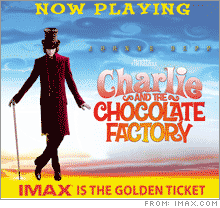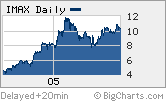 |
| Movie studios have released IMAX versions of several big movies this year, including current box office champ "Charlie and the Chocolate Factory." |
|
 |
| Shares of IMAX have been a hit during the past year and analysts think a sequel of this performance is likely. |
|
|
|
|
|
|
|
|
|
NEW YORK (CNN/Money) – All summer long we've been hearing about how nobody is going to the movies anymore. Hollywood is in its biggest slump in nearly two decades.
Don't tell that to shareholders of IMAX (Research), the company that makes those larger-than-life movie screens. The stock has gained more than 25 percent this year and has more than doubled during the past 12 months.
Several analysts think the stock could continue to be a smash hit on Wall Street.
The Mississauga, Ontario-based company, which has been around since 1967, has 250 theaters operating in more than 35 countries. Up until very recently, the company was best known for having science and educational movies shown on IMAX screens in museums.
But during the past few years, major movie studios have started to release prominent big-budget films in the IMAX format -- and analysts expect the trend will continue.
Size matters
The surprising success of last year's animated Christmas movie, "The Polar Express", which was released in an IMAX 3D format, helped prove that IMAX is a viable option for Hollywood fare. The IMAX version grossed over $45 million since its release and the film will be re-released this November in IMAX theaters.
"'The Polar Express' showed that the 3D IMAX combination could attract an audience that might not have been otherwise interested in the movie," said Dennis McAlpine, an independent media analyst.
This year, IMAX has truly hit the box office jackpot.
Even though ticket sales are down for the movie business overall, IMAX is thriving because cinephiles have flocked to see films such as "Robots," "Batman Begins" and most recently, "Charlie and the Chocolate Factory" in the IMAX format. (The Oompa Loompas must look as tall as Shaquille O'Neal on an IMAX screen. Cool.)
In fact, analysts say that Hollywood's problems could be good news for IMAX since it shows that to get people to leave the comfort of their living room couch to see a movie, they need to offer a unique experience.
"A few years ago the big question was could IMAX get Hollywood content on their screens and theaters to sign up," said Eric Wold, an analyst with Merriman Curhan Ford. "But studios now see the value of putting movies on IMAX screens since consumers have much better home theaters."
Profits are huge too
Currently, IMAX generates the majority of its sales from fees it gets for installing its technology in movie theaters, plus leasing revenue from theater operators once the systems are in place. So opening more theaters naturally leads to more installation fees and lease income. Wold expects IMAX to have more than 300 theaters operating by the end of 2006.
The company also receives a cut of the box office from the IMAX versions of popular movies. Film revenues accounted for about 16 percent of IMAX's total sales in the first quarter and Corey Hammill, an analyst with Paradigm Capital, a Toronto-based boutique investment bank, thinks this percentage will increase drastically over the next few years.
That could lead to a substantial increase in earnings since the cost to convert IMAX films should remain steady.
"Fixed costs won't change so as IMAX increases the number of screens and movies shown, we will start to see profits from the film side really kicking in," Hammill said.
To that end, IMAX's earnings are expected to increase by more than 40 percent from a year ago and another 24 percent in 2006.
Of course there are risks. This is an entertainment stock and IMAX has really only had one major studio partner. Warner Bros. Pictures (which, like CNN/Money, is owned by Time Warner (Research)) is the distributor for "Batman Begins," "Charlie and the Chocolate Factory" and "The Polar Express."
Warner Bros. is also the studio behind the fourth Harry Potter movie, "Harry Potter and the Goblet of Fire", which will be released in November. ("Robots" was released by News Corp.'s (Research) 20th Century Fox division.) So for now, IMAX is kind of a one-trick pony.
McAlpine notes that Walt Disney (Research) will be releasing its next computer generated animated movie "Chicken Little" in November in 3D using technology from Dolby Laboratories (Research) and George Lucas' Industrial Light and Magic. If this is a big hit, it could steal some of IMAX's thunder.
But Wold thinks this isn't a huge concern. "You can probably have more than one competing 3D technology," he said. "To be able to get a movie in 3D on large format screens is something only IMAX can bring."
And Hammill thinks investors are underestimating how much IMAX can earn next year because estimates do not factor in film releases for 2006. So far, there is only one IMAX Hollywood film on schedule but he thinks there will be more announcements in the coming months.
As such, he thinks IMAX could wind up reporting a profit increase of almost 50 percent in 2006.
With that in mind, the stock, currently trading at about 23 times 2006 earnings estimates, looks like a bargain that's almost as big as an IMAX screen.
Someone pass the popcorn.
-----------------------------
For more about personal technology click here.
For a look at more media and entertainment stocks, click here.
Analysts quoted in this story do not own shares of IMAX and their firms have no investment banking relationships with the company.
The writer of this story owns shares of Time Warner through his company's 401(k) plan.
Sign up to receive the Tech Investor column by e-mail.
Plus, see more tech commentary and get the latest tech news.

|